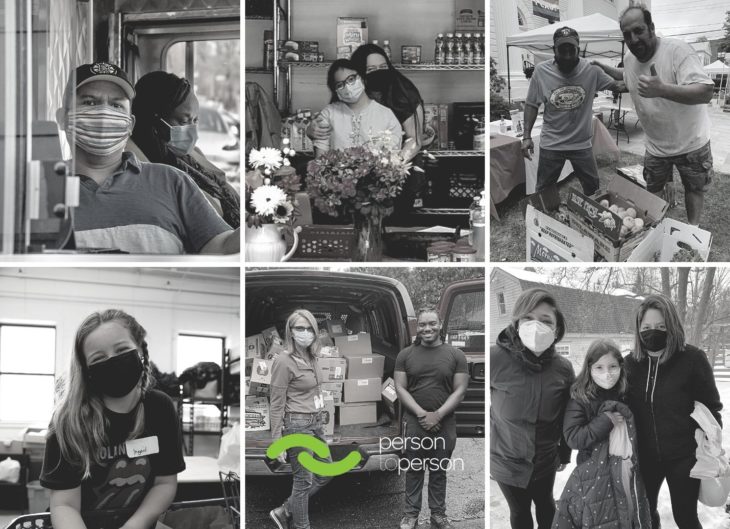
The pandemic has taken a toll on all us in different ways. For our low-income neighbors, however, the financial fall-out has intensified the already strained task of ensuring that there is healthy food on the table and that they are safely housed.
The Person to Person (P2P) staff and volunteers see first-hand every day the need that exists in our community—pre-pandemic, during pandemic, and now. In many ways the need has increased more now due to the perception that everyone is back on their feet. This is not the case. In fact, our Norwalk food pantry recently served more clients in a single day that it ever has before: 83 families and 284 individuals. This is clear evidence that the need is not just great, but growing, in our community.
Low-income, and many ‘working class’ families will continue to battle the consequences of critical need long after the pandemic. It has also made it more difficult for people to break out of the poverty cycle. What was already a heavy burden has now doubled in weight.
P2P has identified five key explanations for this increased burden, and our role in helping to alleviate it.
- The Housing vs. Income Divide
Keeping people safely housed is a foundation of P2P’s assistance. In the first 12 months of the pandemic, P2P provided more than one million dollars in emergency financial assistance during the first year of the pandemic, an astounding 178% increase over the previous year. - The High Expense of Being Low Income
The already high cost of living combined with the pandemic, rising inflation, and disproportionate expenses can leave little money for essential needs like food. Following the start of the pandemic the P2P food program distributed 71% more groceries than the previous year: enough groceries for more than TWO MILLION MEALS, or roughly 5,831 meals per day. - High Childcare Costs vs. Low Wages
At P2P essential services extend beyond food and rent. We provide new families with baby items through our partnership with local hospitals, school-aged children with summer camperships, children and young adults with scholarships and mentorships, as well as our clothing center and holiday programs, such as the annual Toy Store. - Federal Relief Helped … Some
The P2P casework team is on the front lines of assessing need and supporting clients. In the first year of the pandemic, our team experienced a 22% increase in the number of cases they managed. That is thousands of individuals helped by a trained P2P caseworker with financial assistance, working with landlords to pay the rent, ensuring they had healthy food to eat, and also providing a caring voice on the phone. - The Economic Divide
P2P was founded in response to the assassination of Rev. Dr. Martin Luther King, Jr. From the outset, P2P recognized the impact of the racial wealth gap and economic inequities that perpetuate poverty in our community.
P2P helps every person who requests it, regardless of background, race, or immigration status. All are welcome.
As long as there is a need, P2P is here to help.
The seemingly simple task of putting healthy, nutritious food on the table can be a daily challenge. More than 1 in 10 Norwalk and Stamford residents, for example, cannot always afford to buy food for themselves or their family. Add to that keeping up with high rent payments, utility payments, healthcare, and transportation. The pandemic worsened the economic hardships faced by our community dramatically, with many incurring terrible and often insurmountable debt just to survive. Now add to that the rapidly increasing cost of living and inflation.
P2P has both the passion and experience to efficiently and effectively support our community. Buoyed by the backing of our donors, volunteers, board of directors, and partners, P2P is able to maximize its impact and help its 28,000 clients.
Our team leverages each financial and in-kind donation to ensure that we help as many people that need. For example, for every $1 donated P2P provides $5 worth of food.
As long as there is a need, P2P needs your support
No one can predict the future of the pandemic or the economy, but we must be ready. We have witnessed first-hand the devastation of mothers unable to buy food for their children, the elderly not able to get to the supermarket for groceries, and too many families on the verge of eviction.
The only way we can fully support all families with the services they need with the dignity they deserve, is with ongoing support from volunteers and donors.
Note: This content is an excerpt from P2P’s “Understanding the Impact of the Pandemic on Community Need” report. If you would like a full copy of the report, please email marketing@p2pHelps.org.
